Published Jan 21, 2025
How the Arts Have Shaped Star Trek
From the Bard to silent cinema, the arts have had a profound impact on the world of Star Trek.

StarTrek.com
Watching was possibly the first time I ever heard Shakespeare performed. However, it wasn't until I was studying theater at University that it dawned on me that members of Starfleet can always be seen either enjoying or participating in a stage play or musical performance. And, as a student of theater, I became fascinated by the fact that the arts not only get brought up as human cultural touchstones, but sometimes entire Trek plots hinge on theater, music, or cinema.
The work of William Shakespeare himself is baked into the bones of Star Trek, not to mention other literary and artistic works. But what art withstands galactic and temporal wars as we journey into the future?
William Shakespeare
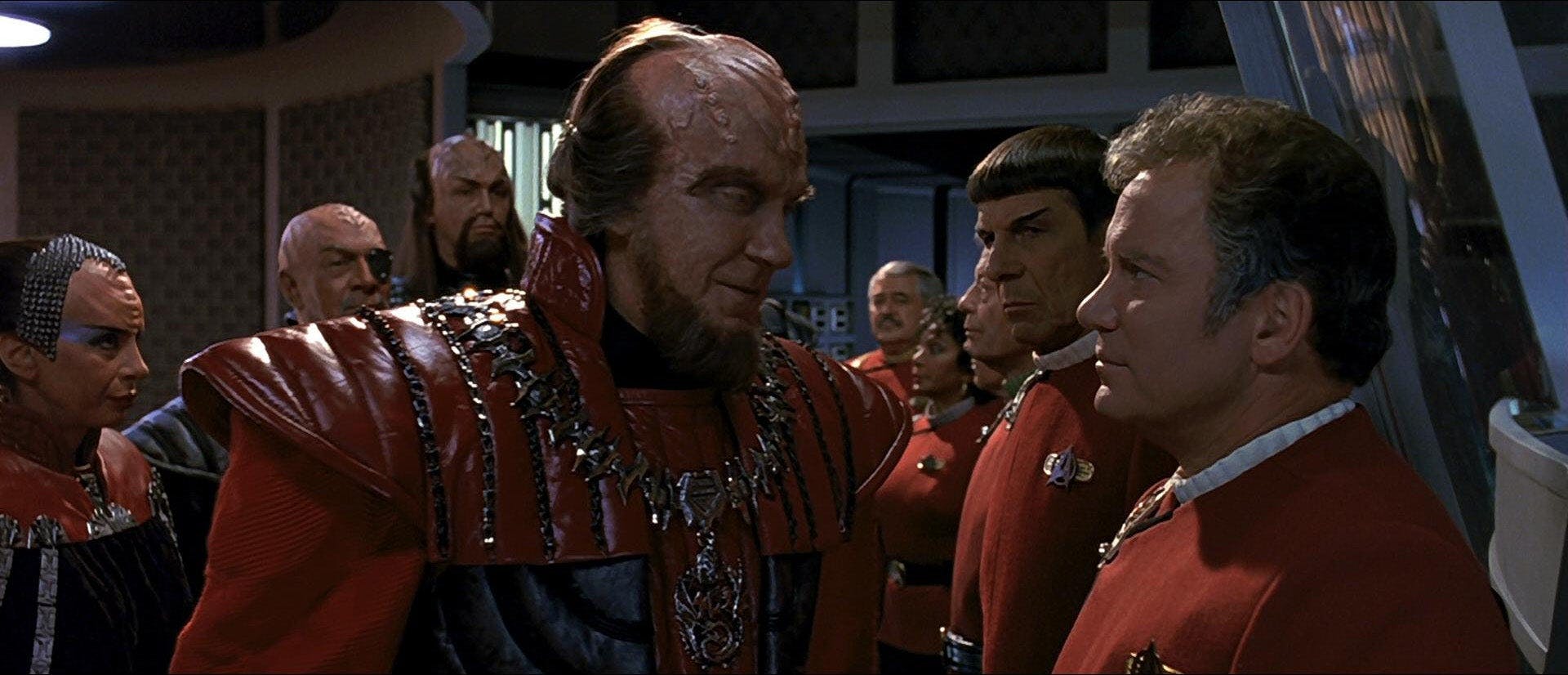
Star Trek VI: The Undiscovered Country
StarTrek.com
The Bard's DNA is baked so deeply into Star Trek that I could spend several essays noting and dissecting references to his work in everything from to .
is so steeped in Shakespeare that the title of the film itself is a reference to Hamlet's soliloquy:
"To grunt and sweat under a weary life,
But that the dread of something after death,
The undiscovere'd country, from whose bourn
No traveler returns, puzzles the will,
And makes us rather bear those ills we have
Than fly to others that we know not of?"
In this film, we're shown that Klingons love Shakespeare, with Chancellor Gorkon stating that Shakespeare could only truly be experienced in the original Klingon. There must be something about Shakespeare's poetry of passion and violence that appeals to the Klingons and humans alike.
TNG was also steeped in Shakespeare. My favorite TNG moment comes when Q argues with Picard by quoting Macbeth, "Life's but a walking shadow. A poor player who struts and frets his hour upon the stage…" To which Picard replies, "Oh, I know Hamlet. And what he might say with irony, I say with conviction: 'What a piece of work is man! How noble in reason! How infinite in faculty! In form, in moving, how express and admirable! In action, how like an angel! In apprehension, how like a god!'"
Surely, you don't see your species like that, do you?"
"I see us one day becoming that, Q. Is it that which concerns you?
Q and Captain Jean-Luc Picard, "Hide and Q"
In this exchange, Picard illuminates what Star Trek is all about, humans at their best can become godlike when they shuck off their worst aspects. Apparently, William Shakespeare not only lasts into the 24th Century, but also influences the leadership styles of at least three disparate species. Now that's an artistic reach.
Detective Fiction
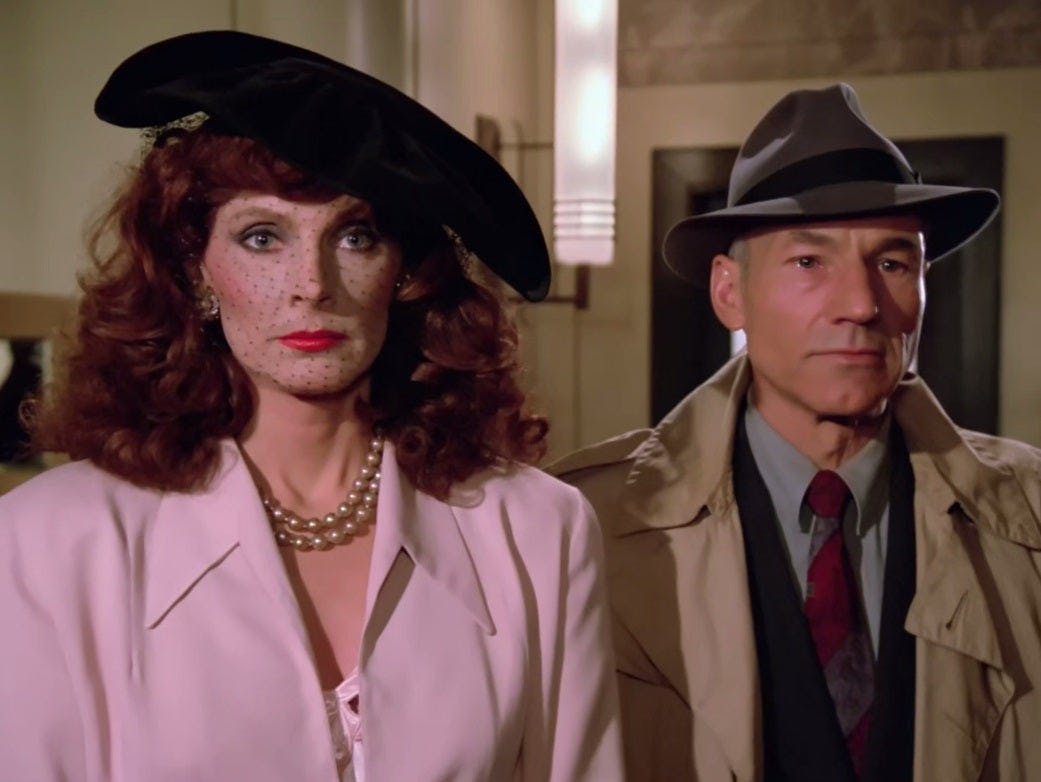
"The Big Goodbye"
StarTrek.com
Raise your hand if your first exposure to pulp detective fiction and film noir came in the form of a hardboiled detective named Dixon Hill. In the world of Star Trek, private investigator Dixon Hill was the star of a series of 1940s detective novels and film adaptations, most of which were destroyed in the Eugenics Wars.
During the events of Star Trek: The Next Generation, Captain Picard takes to the holodeck to don the fedora of Dixon Hill and solve romantic mysteries in 1940s San Francisco. The TNG episode "" owes much to the Dashiell Hammett novel The Maltese Falcon and the John Huston film adaptation. This episode features a cast of colorful pulp characters searching for a mysterious unnamed item reminiscent of the falcon statue.
It is revealed the Enterprise's Lt. Commander Data gains a fascination with Sherlock Holmes stories following curiosity over the term "private eye" in "." Later, Data takes on the infamous literary detective role in "" and "," which sees Data face off against the Napoleon of Crime himself, Professor James Moriarty. Data was the perfect analog for Holmes as both characters are considered thinking machines.
's Dr. Julian Bashir also uses a holosuite to take on the role of a different kind of literary investigator. Dr. Bashir inhabits the part of a British secret agent on 1960s earth. Audiences would recognize Bashir's secret agent as heavily inspired by Ian Flemming's James Bond novels and the film series adaptations by MGM in the DS9 episode "." Much like Dixon Hill, or Sherlock Holmes, Bashir's secret agent showcases not just familiar characters taking on cultural touchstones but showcases the lasting impact of popular pulpy entertainments.
Gothic Romance
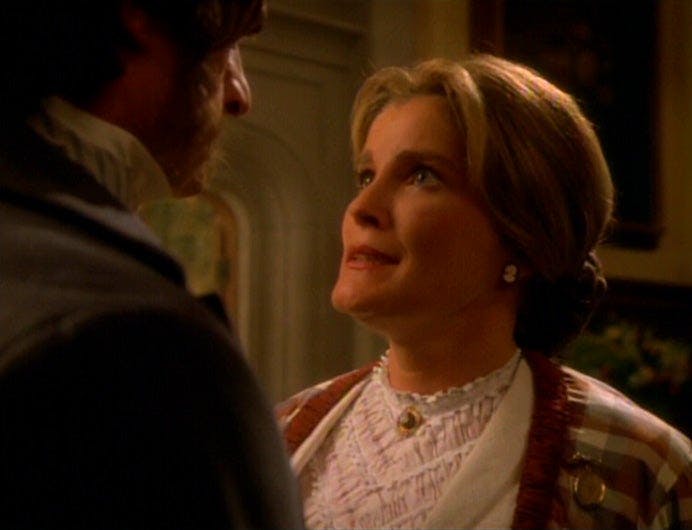
"Persistence of Vision"
StarTrek.com
was the first of the Trek series to discuss the concept of the "holonovel," a work of fiction one can experience firsthand. Perhaps Tom Paris' Captain Proton series is the most famous of these, obviously inspired by Saturday afternoon matinees like Buck Rogers.
But the more classical version of the holonovel is Captain Janeway's "Janeway Lambda One" program. The holonovel features Janeway playing the part of a British governess, freshly hired by Byronic hero Lord Burleigh to care for his two children following the death of their mother. The story is reminiscent of Jane Eyre, featuring mysterious occurrences in Lord Burleigh's mansion, including sightings of the supposedly dead Lady Burleigh. Janeway Lambda One is similar to the other holodeck programs previously mentioned in that it takes the form of a mystery. Still, it also comes from the grand tradition of gothic and romantic literature, borrowing heavily from the literary works of Henry James, Jane Austen, and Daphne du Maurier.
Silent Cinema
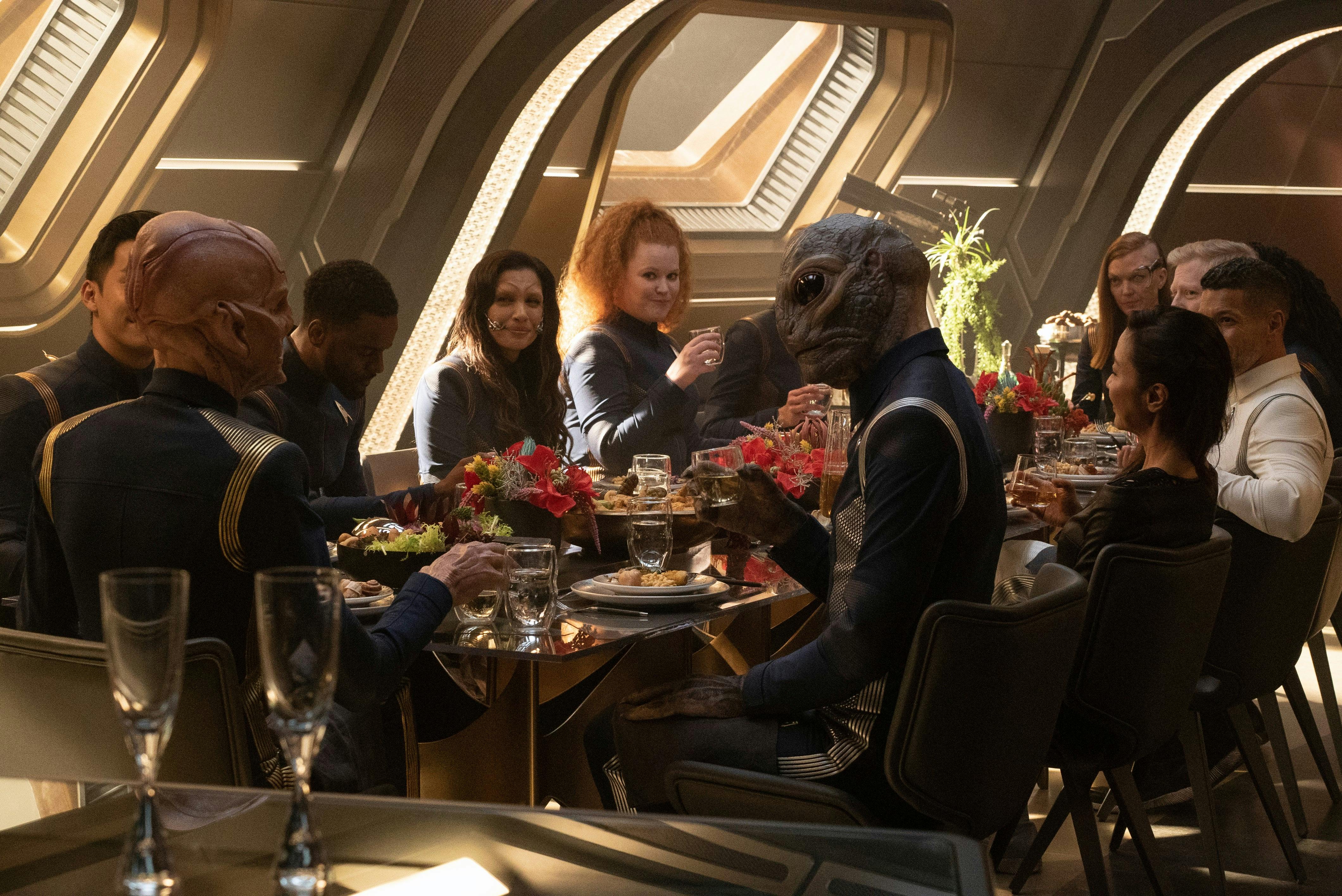
"Forget Me Not"
StarTrek.com
In the Discovery episode "," after his officer dinner, planned as a respite, devolves into several fights among crewmen, Saru states, "I do not need an endless list of activities. I need something meaningful to heal my crew." The ship's computer laughs in response. It turns out that even in the darkness of space and the uncertainty of the future, laughter is still the best medicine. The computer and Saru program a movie night for the crew of the Discovery, and the movie? The Buster Keaton silent film classic Sherlock Jr.
The scene is beautifully fascinating with the juxtaposition of a silent film holographically projected onboard a state-of-the-art starship. Proof that humans are human no matter how far they venture and that laughter truly is the best medicine. Discovery's computer Zora put it best, "Among many sentient beings, laughter is both healing and meaningful. 20th-Century earth comedians such as Buster Keaton or Charlie Chaplin are communal unifiers without the need for language." This scene shows how the arts can reach different cultures, healing across time and space.
Fine Art
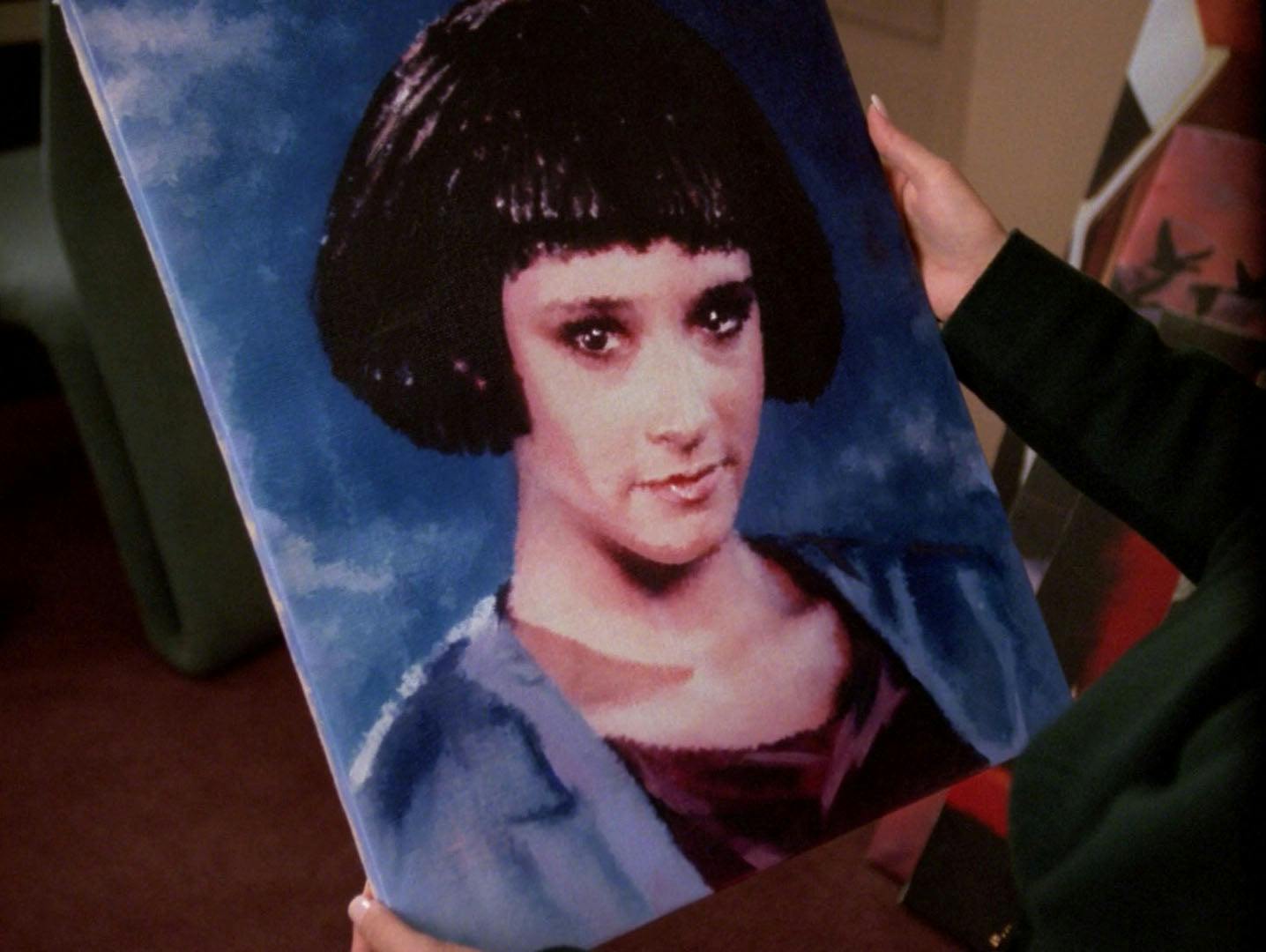
"Inheritance"
StarTrek.com
One of the main themes of The Next Generation was Lt. Commander Data exploring what it means to be human. Data would work in the fine arts by taking a ceramics class with Counsellor Troi, who tasked him to use his imagination by creating a ceramic representing "music."
However, perhaps the most continuous artistic pursuit of Data was his love of painting. Data's first painting was seen in episode "," and featured his interpretation of zylo eggs as a way to exhibit his creativity in the arts. Throughout the series, Data would move away from the photorealistic work he had previously created and try his hand at different art styles like the abstract painting of his cat Spot in "," or his expressionist period painting of the Battle of HarOs, which he gifts to Worf for his birthday. Data would go on to paint a series of works based on dreams he had or remembrances of his father, Dr. Soong. In these instances, Data was using art as a way to deal with unresolved feelings and abstract ideas, and what could be more human than that.
Music

"Virtuoso"
StarTrek.com
As mentioned previously, the crews of Starfleet are constantly hosting a concert in their banquet halls. Trombone player Commander Riker adores jazz, regaling his crewmates with trombone recitals. As mentioned in "," Harry Kim is an adept clarinet player and composed a concerto titled "Echoes of the Void," which he intended to play for his crewmates once they were safely home.
But perhaps the best example of what music means in the Trek universe comes from Voyager and the episode "." In this episode, The Doctor sings to a group of newly contacted aliens who have never heard singing before. These vocal talents turn The Doctor into a celebrity as he is asked to sing opera for these beings, and it changes their culture forever. However, as The Doctor gets sidelined for a duplicate hologram designed only for performing, the character explains that music is more than just programming.
This episode gives the definitive closing argument for the arts in Star Trek, with The Doctor stating, "Music is more than mathematics, and I am more than a program with musical subroutines. All of my experience, all of my passion goes into every note that I sing. When you listen to me, when my singing moves you, you're not just hearing my notes. You're hearing my artistry, my soul."
For we see these characters not just exploring the final frontier in space, but using art to explore the final frontier within themselves.





